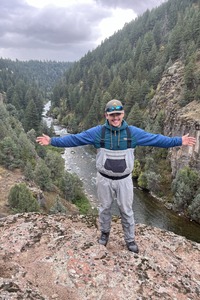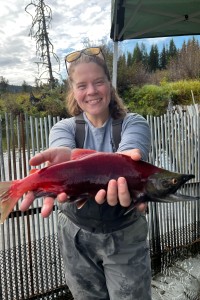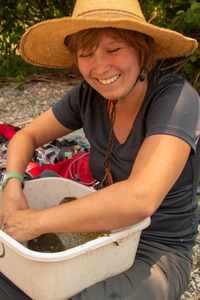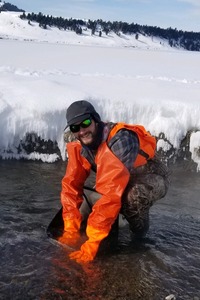The ISU Stream Team
Faculty and Graduate Students
.jpg)
Colden V. Baxter
Professor
Ecology of Freshwater Organisms
Ecosystems & Social-Ecological Systems
Office: Life Sciences 310
Research
Lab: Life Sciences 310
208-282-2139
Research conducted by Dr. Baxter and his group of students and collaborators focuses on rivers and streams, but more generally on the ecological linkages between water and land. The group’s studies are aimed at improving understanding of the basic nature of reciprocal connections between streams, floodplains, and riparian forests, the consequences of their disruption by human activities, and also contributing to better-informed conservation and stewardship. They also investigate watersheds as social-ecological systems, asking, for instance, how human perceptions and behaviors influence, but are also influenced by rivers.
Teaching
BIOL 2209/2209L - General Ecology
BIOL 4462/5562 - Freshwater Ecology
BIOL 6604 - Advanced Ecology of Streams and Rivers
BIOL 5599 - History & Philosophy of Biology
BIOL 1192 - Introduction to Ecology
BIOL 489/589 - Field Ecology
Biol 4491 - Analysis of Complex Systems
Biol 6651 - Advanced Ecology of Communities & Food Webs
Biol 6690 - Careers in Life Sciences
Biographical Sketch
Dr. Baxter leads the ISU Stream Ecology Center, directs the Center for Ecological Research and Education (CERE), serves on ISU's Faculty Senate, and recently served as president of the Society for Freshwater Science. He grew up ranching, principally in northwest Montana, and received training in biology and geology (BA, Univ. Oregon), ecology (MSc, Univ. Montana), fisheries science and philosophy of science (Ph.D., Oregon State Univ.), and food web studies (postdoctoral fellowship, Colorado State Univ. & Hokkaido Univ., Japan).
Education
2002, Ph.D. Fisheries Science, Oregon State University, Corvallis, OR
1997, M.S. Organismal Biology and Ecology, University of Montana, Missoula, MT
1993, B.A. Biology and Geology, University of Oregon, Eugene, OR
2002-2004, Postdoctoral fellow, Stream-forest food webs, Colorado State University, Fort Collins, CO
Selected Publications
Paris, J. C., Baxter, C. V., Bellmore, J. R., & Benjamin, J. R. (2024). Food‐web dynamics of a floodplain mosaic overshadow the effects of engineered logjams for Pacific salmon and steelhead. Ecological Applications, e3076.
Jossie, E., Seaborn, T., Baxter, C. V., & Burnham, M. (2023). Using social‐ecological models to explore stream connectivity outcomes for stakeholders and Yellowstone cutthroat trout. Ecological Applications, 33(8), e2915.
Adams, M. M., Baxter, C. V., & Delehanty, D. J. (2023). Emergence phenology of the giant salmonfly and responses by birds in Idaho river networks. Frontiers in Ecology and Evolution, 11, 804143.
Torgersen, C. E., Le Pichon, C., Fullerton, A. H., Dugdale, S. J., Duda, J. J., Giovannini, F., ... & Baxter, C. V. (2022). Riverscape approaches in practice: Perspectives and applications. Biological Reviews, 97(2), 481-504.
Marcarelli, A.M., C.V. Baxter, J. Benjamin, Y. Miyake, M. Murakami, K. Fausch, and S. Nakano. 2020. Magnitude and direction of stream-forest community interactions change with time scale. Ecology 101(8): doi:10.1002/ecy.3064.
Walters, D.M., W.F. Cross, T.A. Kennedy, C.V. Baxter, R.O. Hall, Jr., and E.J. Rosi. 2020. Food web controls on mercury fluxes and fate in the Colorado River, Grand Canyon. Science Advances 6(20): eaaz4880.
Collins, S.F., C.V. Baxter, A.M. Marcarelli, M.S. Wipfli, S. Florin, L. Felicetti, and G. Servheen. 2019. Reverberating effects of resource subsidies in stream-riparian food webs. Oecologia 192:179-189.
Quintas-Soriano, C., J. Brandt, K. Running, C. V. Baxter, D. M. Gibson, J. Narducci, and A. J. Castro. 2018. Social-ecological systems influence ecosystem service perception: a Programme on Ecosystem Change and Society (PECS) analysis. Ecology and Society 23(3):3.

Lucas Ellingson-Cosenza
Advisor: Dr. Colden Baxter
Degree: M.S. Biology
Office: Life Sciences 310
2023, B.S. Biology/Fisheries and Wildlife Sciences, Oregon State University, Corvallis, OR

Anna Reside
Advisor: Dr. Colden Baxter
Degree: M.S. Biology
Office: Life Sciences 310
2021, B.Sc., Ecology and Evolutionary Biology, Yale University, New Haven, CT
.jpg)
Alex Stacy
Advisor: Dr. Colden Baxter
Degree: M.S. Biology
Office: Life Sciences 310
2020, M.S. Environmental Biology, Regis University, Denver, CO. Journal Manuscript: Macroinvertebrate Assemblages Indicate Declining Ecosystem Diversity for In-Stream Restoration Sites at Deer Creek, CO.
2019, B.A. Environmental and Earth Sciences, Willamette University, Salem, OR.

Kaitie J. Warner (formerly Wauhkonen)
Advisor: Dr. Colden Baxter
Degree: M.S. Biology
Office: Life Sciences 310

Jade Ortiz
Advisor: Colden Baxter
Degree: Ph.D. Biology
Office: Life Sciences 310
Education
2015, B.S. Biology, Michigan Technological University, Houghton, MI
Biographical Sketch
Jade began pursuing her doctoral degree in the Stream Ecology Center with Colden Baxter in 2015. Her research interests converge at the interface of landscape and food-web ecology. In particular, Jade’s doctoral work investigates the ways in which habitat complexity in river floodplains may mediate patterns of insect emergence and subsequent consequences for terrestrial insectivores including spiders, beetles, birds, and bats. As part of the NSF-EPSCoR MILES (Managing Idaho’s Landscapes for Ecosystem Services) program, Jade conducted a study of habitat complexity on the Portneuf River with the aim of informing local river restoration efforts. Jade has played an active role in the Biology Department at ISU through service as president of the Biology Graduate Student Association and participation in a search committee for the Dean of the College of Science and Engineering. Prior to moving to Pocatello, she worked as a lab and field technician with Amy Marcarelli at Michigan Tech from 2011 to 2015 on a suite of projects, several of which focused on furthering understanding of algal and macrophyte interactions. In her free time, Jade enjoys sipping coffee, petting cats, and floatin’ down rivers.
Teaching
BIOL 4462 - Freshwater Ecology (Supervised Teaching Intern)
Current Research
208-282-2139
Jade's research interests focus on understanding how habitat complexity in river-floodplain ecosystems influences linked aquatic-terrestrial food webs. Her doctoral work seeks to inform the management of local rivers and floodplains of southeastern Idaho.

Jeremy M. Brooks
Postdoctoral Researcher
Office: Life Sciences 310
Research and academic interests
-Stream-riparian ecology
-Foodweb interactions
-Aquatic-terrestrial linkages
-Biology education and student-led scientific argumentation
-Philosophy of science
Biographical sketch
Jeremy Brooks is a Postdoctoral Researcher working with Dr. Colden Baxter and joined the Stream Ecology Center in the fall of 2017. He is conducting research funded by an NSF-RAPID grant to evaluate how riparian vegetation mediates the consequences of climate change-induced extreme flooding for stream-riparian food webs and communities in northern Yellowstone. For his PhD, he evaluated how community traits and interactions mediated reciprocal linkages across a mosaic of stream-riparian ecosystems, also in northern Yellowstone.
Jeremy is also an Adjunct Instructor and Research Scientist at the University of Montana, where he is currently co-teaching Fish Biology and Management (BIOO 340) and investigating the long-term effects of wildfire on stream food webs in the Bitterroot River watershed with Dr. Lisa Eby (Professor of Aquatic Ecology at the University of Montana).
Before attending Idaho State University, he graduated from the University of Montana with a bachelor’s degree in Wildlife Biology and a minor in Communication Studies. During his undergraduate years, Jeremy worked with Dr. Lisa Eby in the Absaroka-Beartooth Wilderness to study how stream confluences influence aquatic insect communities in the context of the River Continuum Concept. When he isn’t measuring rocks and scrubbing biofilm with his toothbrush, Jeremy enjoys fly fishing, hiking, skiing, tracking wildlife through the snow, and sipping coffee in the morning.
University Teaching Experience
Fish Biology and Management, BIOO 340 (4 credits, lecture, and lab combined), fall 2023 (instructor of record) and 2024 (co-teaching). W.A. Franke College of Forestry, Wildlife Biology Program, University of Montana in Missoula, Montana, USA
Philosophies, Theories, and Practices of Ecology, BIOL 6692 (1 credit, lecture), spring 2022 (co-teaching). Department of Biological Sciences, Idaho State University in Pocatello, Idaho, USA
General Entomology Lab, BIOL 4431/5531 (4 credits lecture and lab combined), fall 2021 (co-teaching ~1/3). Department of Biological Sciences, Idaho State University in Pocatello, Idaho, USA
Invited Lectures
Idaho State University, BIOL 6604, Freshwater Ecology. Aquatic Insects: More than just Functional Feeding Groups. Lecture delivered in 2023.
Idaho Master Naturalist: High Desert Chapter. Aquatic Insects and Yellowstone’s Stream-Riparian Ecosystems. Lectures delivered in 2022 and 2023.
Idaho State University, BIOL 4431/553, General Entomology. Aquatic Insects. Lecture delivered in 2022.
Idaho State University, GEOL 1101, Physical Geology. Tangled Webs: Trophic Cascades, Land-water Linkages & Ecological Complexity in Yellowstone’s Web of Life. Lectures delivered in 2020, 2021, and 2022.
Selected grants/scholarships
2025 David H. Smith Conservation Research Fellowship (Smith Fellowship): The influence of pyrodiversity on biodiversity of stream-riparian ecosystems: Lessons from long-term investigations of a working forest and a wilderness in the western US. In review. Principle Investigators: Jeremy Brooks (lead) in collaboration with Drs. Colden Baxter (Idaho State University), Kellie Carim (US Forest Service), and Lisa Eby (University of Montana). Award amount if funded: $182,100.
NSF RAPID: Does riparian vegetation state mediate consequences of climate change-induced extreme flooding for stream-riparian food webs and communities? 2022 – present. National Science Foundation (Award ID 2244011). Principal Investigator: Colden V. Baxter. I (Jeremy Brooks) was a key co-author as a PhD Candidate and am leading grant activities as a post-doctoral scholar. $99,882
Susan B. Martin Scholarship. 2022. Idaho Chapter of the American Fisheries Society. $2000
Selected honors and awards
Andy Sheldon Endowment Award, Society for Freshwater Sciences. Freshwater Sciences Joint meeting with Society for Freshwater Sciences, Australian Society for Freshwater Sciences, and New Zealand Society for Freshwater Sciences. June 3 - 7, 2023, Brisbane, Australia.
Best Student Presentation, Western Division of the American Fisheries Society. May 9 – 11, 2023, Boise, Idaho, USA
Education
Ph.D., Biology, 2024. Department of Biological Sciences, Idaho State University, Pocatello, Idaho. Minor in Biology Education. Advisor: Dr. Colden Baxter. Dissertation Title: There and Back Again: Community Traits and Interactions Mediate Reciprocal Linkages across a Mosaic of Stream-Riparian Ecosystems in Northern Yellowstone
B.S., Wildlife Biology with Aquatic Concentration and Honors, 2017. Wildlife Biology Program, University of Montana, Missoula, Montana. Minor in Communication Studies. Advisor: Dr. Lisa Eby
Selected publications
Brooks, J. M., Baxter, C. V., MacNeill, K., Warren D., and Ripple, B. (In prep). There and back again: traits of organisms and their interactions mediate reciprocal linkages across a mosaic of stream-riparian ecosystems in northern Yellowstone National Park. The target journal is Ecological Monographs.
Brooks, J. M., Baxter, C. V., MacNeill, K., and Warren, D. (In prep). Enter the mosaic: Aquatic-terrestrial reciprocal fluxes and food webs are dynamically interdependent across space and through time. Invited to submit to a special issue in Freshwater Biology.
Brooks, J. M., Behn, K.E., Baxter, C. V., Kennedy, T. A., and Kraus, J. M. (In review). Note-to-self: Stop applying Sabo et al.’s length-mass regression for adult Nematocera to adult Chironomidae (try these instead). Submitted to Freshwater Science.
Brooks, J. M., Grinath, J. B., Rasmussen, A. M., & Grinath, A. S. (2023). I Know That’s a Grasshopper, but I Don’t Know Why: An Argument-Driven Inquiry Activity for Teaching Taxonomy. The American Biology Teacher, 85(3), 159-163.
Kauffman, J. B., Cummings, D. L., Kauffman, C., Beschta, R. L., Brooks, J., MacNeill, K., & Ripple, W. J. (2023). Bison influences on composition and diversity of riparian plant communities in Yellowstone National Park. Ecosphere, 14(2), e4406.
Current Lab Staff & Undergraduate Researchers
Hannah Clawson
Carson King
Emilee Martin
Stuart Shipley
Heather Swartz

Remembering Wayne "Doc" Minshall
Leader of the Stream Ecology Center, 1966-2003
PhD - University of Louisville
Years of Service 1966 - 2003
Remembering Dr. G. Wayne Minshall
On April 21st, 2020 the Stream Ecology Center lost its founder and long-time leader, Dr. G. Wayne Minshall. A giant in stream ecology for the last 50 years, his passion for streams was matched only by his love of wilderness and the students and colleagues with whom he shared it. Though most known for his work on the River Continuum Concept (RCC), Dr. Minshall published groundbreaking papers in many of the sub-disciplines that have come to define stream ecology. He was also among the first stream ecologists to engage in land management and conservation work, bridging the perceived divide between “basic” and “applied” science, and navigating the connections between science and policy. Wayne, or “Doc” to his friends and colleagues, was born in Billings but raised in rural Montana near Lockwood. He received a B.S. in Fisheries Management from Montana State University (1961) and a PhD in Zoology from the University of Louisville (1965) where he met his wife Judy who shared his love of, and academic interest in, lakes and streams. He then completed a NATO postdoctoral fellowship at the Freshwater Biological Association’s Windermere Laboratory in England under the mentorship of Dr. T.T. Macan, the founding editor of Freshwater Biology.
He joined the Idaho State University faculty in 1966 where he spent his entire career, retiring in 2003 but remaining active in research and mentoring graduate students until his passing. Doc received the NABS (now Society for Freshwater Science; SFS) Award of Excellence in 1994 and was inducted as a fellow of the American Association for the Advancement of Science (AAAS) in 2004. In 2017, he became a member of the inaugural class of SFS Fellows. Doc also helped to establish the Petersen Award, the SFS Endowment Award for European scientists, in honor of his colleague R.C. “Bob” Petersen.
Over his career, he authored ~150 peer-reviewed articles, received more than 100 research grants, and produced 130 technical reports. More than 50 students completed their graduate degrees under his direction and many of them remain in the field of freshwater science.
The breadth of Wayne’s contributions to stream ecology is extraordinary (see list of publications for corresponding numbers referenced below). Doc’s early work included seminal papers on the roles of allochthonous detritus (2) and autochthony (18) in the energetics of stream organisms and ecosystems, factors controlling invertebrate community structure (5, 7, 13), invertebrate drift (4), and the feeding behavior, bioenergetics and thermal biology of aquatic insects (10, 16, 21). Much of his early research at ISU focused on cold desert streams under the auspices of the International Biological Program (IBP). Of course, Doc is best known as one of the driving forces behind the development of the RCC (27) and associated studies. With his close friend and colleague, Robin Vannote, Doc helped organize and lead the original RCC workshops, served as lead PI on the awards that funded the RCC research, and led some of its most impactful papers (39, 57, 78). A driven scientist devoted to understanding streams, Doc would go on to make significant contributions to diverse aspects of stream ecology right up until his recent passing. Noteworthy among these were his contributions to understanding the role of natural disturbances in controlling the structure and function of stream-riparian ecosystems (46, 61, 66) with a specific focus on the effects of wildfire (67, 103, 107, 119) and the medium- to longer-term dynamics that follow (120, 126, 131, 133, 139, 143, 145). His decades-long work with students and colleagues in the central Idaho wilderness and Yellowstone National Park revealed how natural wildfire cycles combine with climate regimes, geomorphic forces, and vegetation life histories to create the dynamism essential to maintaining the ecological character of streams and rivers. Throughout his career, he made significant contributions across levels of ecological organization from individuals and populations (especially of stream invertebrates;1, 6, 10, 11, 19, 24, 36, 58, 64, 118), to communities (5, 13, 17, 23, 26, 33, 45, 58, 61, 80, 106, 109), food webs (2, 9, 91, 133), and ecosystem processes like nutrient (110, 125, 147) and organic matter dynamics (22, 83, 112, 116, 121, 122). His work uncovered the natural characteristics and dynamics of wilderness streams, but also tackled many dimensions of human impacts, from water pollution and habitat degradation associated with land uses (9, 88, 130) to consequences of dams (134), invasive species (111, 141) and climate change (142, 143). His long-term study of Yellowstone fires (2014) produced one of the best long-term data sets on aquatic insects, often on a shoestring budget, and was recently featured in a global meta-analysis of insect abundance (van Klink et al. 2020).
Doc was a pioneer among stream ecologists in his commitment to engaging in emerging problems associated with land management and pollution. He frequently advised conservation groups on applications of aquatic science to address human impacts, bridging the traditional divide between “basic” and “applied” science in various ways including the development of bioassessment and long-term monitoring approaches (76, 89, 105, 114, 115, 140). He was active in local and state environmental issues, testified before congressional committees, served on a number of governmental panels addressing environmental issues, and was on the Board of Directors of the Pacific Rivers Council for many years. In 1969, he scripted the documentary film, “The Changing River”, which raised concerns about pollution in the years leading up to the Clean Water Act. Wayne’s commitment to connecting science, policy, conservation, and education is reflected in the advice for young scientists he wrote with his induction as an SFS Fellow and is demonstrated in the career trajectories of his students, many of whom went on to roles in government management agencies and conservation organizations.
Central themes woven through the entirety of Doc’s life were his love of wilderness and “the old ways.” Nearly every summer since the late 1970s, Doc spent significant time deep within Idaho’s Frank Church-River of No Return Wilderness with his family, his students, and colleagues. His time in the wilderness fueled much of the science described above but also fulfilled his deep curiosity and interest in the ways and customs of the people who settled in these areas. He was a practitioner and teacher of these ways—he and Judy taught an ISU class in “practical homesteading,” focused on skills needed for living off the land, and they often used their farm for the class. The farm hosted a menagerie of rabbits, sheep, pigs, ducks, goats, chickens (the family supplied eggs to a network of grateful customers for decades), and, Doc’s other passions, Airedale terriers and horses. Over the years, many of his graduate students were exposed to farm life and especially to horses, as horse-packing into the wilderness to maintain long-term studies became an annual event. In “retirement,” Doc continued to return to the central Idaho wilderness, often accompanying ISU class field trips and annual monitoring expeditions that continue to the present. His interest in late 1800s Idaho wilderness exploration and homesteading resulted in three books published on the subject (2012, 2014, and 2018) that used original diaries and firsthand accounts to explore the forces that link people, landscapes, and rivers through history.
Doc’s impact on our science is rivaled only by the influence he had on his colleagues and students. His early collaborations formed life-long professional and personal relationships. Wayne’s closest colleagues, Robin Vannote and Colbert (Bert) Cushing (who also passed away recently, see remembrance), were effectively members of his lab group and it was common for his students to spend substantial time in the field with either. In retirement, Doc maintained an office in the Stream Ecology Center, attended weekly lab meetings, and served on numerous student committees—particularly those whose research built on the long-term studies he began. He developed a rich collaboration and friendship with his successor, Colden Baxter, which helped create a “multi-generational” science experience for students.
It has become cliché, but to join the Minshall stream team was to join a family. This family came complete with traditions like memorable holiday parties (at which all were expected to deliver poetry) and annual road trips to NABS/SFS! Doc had an innate ability to draw out the best in his students and colleagues. His welcoming demeanor, ability to laugh heartily and often, and to provide his students with complete and undivided attention conveyed how much he cared for those he worked and lived with. Inclusion in this family did not end with graduation. Rather, it continued to grow from those humble beginnings (usually in the middle of the wilderness with a very large horse) and continues to grow through the many lifelong friendships and collaborations that started in Doc’s lab. Beyond his mentorship and example, Doc became and remained a father (even grandfather!) figure to many students and his loss resonates with all who knew him.
Wayne is survived by his wife Judy and his children Jennye, Michele, and Jacob. In his name, in 2004 ISU established the annual G.W. Minshall Lecture Series in Ecology, annually hosting a leader in freshwater ecology. ISU is working to establish the G.W. Minshall Archive in its library and has created the G. Wayne Minshall Stream Ecology Fund to support student research and long-term studies, to which contributions can be made in his name (or contact Rich Ballou at ballrich@isu.edu or (208) 709-1174).
Adapted from text by Steve Thomas and Colden Baxter for the Society for Freshwater Science
Alumni (since 2006)
Graduate Students
Sawyer Finley (M.S., 2023)
Laurel Faurot (M.S., 2022)
Lizzie Jossie (M.S., 2022)
James Paris (Ph.D., 2022)
Adam Eckersell (M.S., 2019)
McKenna Adams (M.S., 2019)
Kate Behn (M.S., 2017)
Matt Schenk (M.S., 2017)
Kaleb Heinrich (D.A., 2015)
Scott Collins (Ph.D., 2014)
Jennifer Cornell (M.S., 2013)
Ryan Blackadar (M.S., 2013)
Hannah Harris (M.S., 2013)
Ryan Bellmore (Ph.D., 2011)
Kevin Donner (M.S., 2011)
Madeleine Mineau (Ph.D., 2010)
Heather Bechtold (Ph.D., 2010)
Joe Benjamin (Ph.D., 2010)
Sara Owen (M.N.S. & lab assistant)
Melissa Holocek (M.N.S., 2008)
Rachel Malison (M.S., 2008)
Jason Jones (M.S., 2008)
Christina Relyea (Ph.D., 2007)
Jessica Hopkins (D.A., 2007)
Amanda Rugenski (M.S., 2006)
Postdoctoral Researchers
Dr. Danelle Larson (postdoc, 2014-2016)
Dr. John Davis (postdoc, 2009-2012)
Dr. Amy Marcarelli (postdoc, 2006-2009)
Dr. Mike Yard (postdoc, 2007-2008)
Undergraduate Researchers & Staff
Noah Healy (2023-2024)
Nina Keck (2022-2024)
Brandy Smith (2022-2023)
Colton Turner (2021-2022)
Lauren Stidham (2020-2021)
Nathan Mansor (2020-2022)
Brianna Lords (2019-2020)
Heath Goertzen (2019-2020)
Kevin Fitzgerald (2019 - 2020)
Jeremy Starkey (2017)
Adam Eckersell (student and staff member, 2014-2017)
Hawley Hawkes (2016)
Kyndra Hawkes (2016)
Nolan Brown (2016)
Martin Ventura (staff, 2014-2015)
Matthew Lyon (2012-2015)
Alex Bell (2009-2013)
Tess Gardner (2011-2012)
Nathaniel Tillotson (2010-2013)
Nichelle Heyrend (2010-2011)
Devin Baumer (2011)
Matthew Schenk (student and staff member, 2010-2013)
Jessica Lueders-Dumont (staff, 2010)
Rebecca Martin (staff, 2009)
Melinda Walker (2009)
David Owens (2008)
Mike Lance (2007)
Patrick Della Croce (2005)
Visiting International Scholars
Alice Zuagg (Undergraduate student, ETH Zurich, Switzerland--2019)
Miriam Schaerer (M.S. student, University of Zurich, Switzerland--2014)
Dr. Yo Miyake (faculty, Ehime University, Japan--summer 2009)
Iraima Verkaik (Doctoral student, Universitat de Barcelona, Spain--summer 2008)
Elizabeth Penman (Undergraduate student, University of Leeds, UK--summer 2008)

